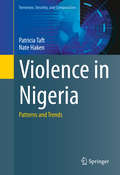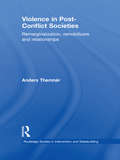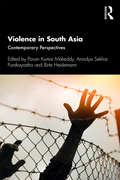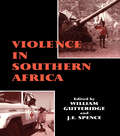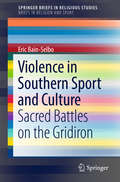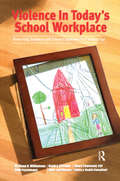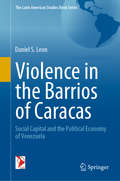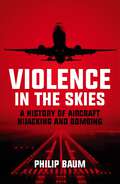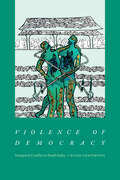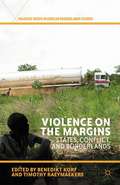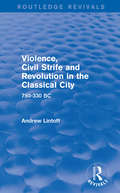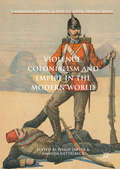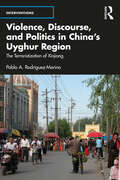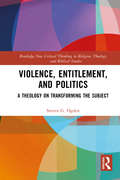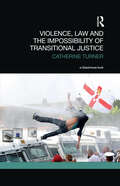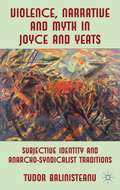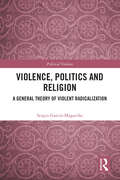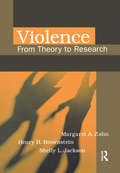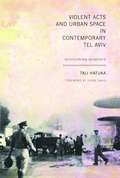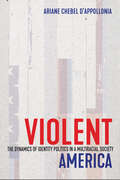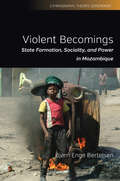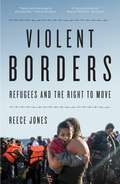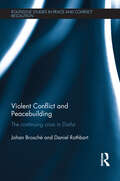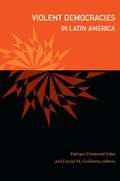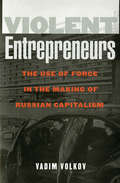- Table View
- List View
Violence in Nigeria
by Patricia Taft Nate HakenThis book takes a quantitative look at ICT-generated event data to highlight current trends and issues in Nigeria at the local, state and national levels. Without emphasizing a specific policy or agenda, it provides context and perspective on the relative spatial-temporal distribution of conflict factors in Nigeria. The analysis of violence at state and local levels reveals a fractal pattern of overlapping ecosystems of conflict risk that must be understood for effective, conflict-sensitive approaches to development and direct conflict mitigation efforts. Moving beyond analyses that use a broad religious, ethnic or historical lens, this book focuses on the country's 774 local government areas and incorporates over 10,000 incidents coded by location, date and indicator to identify patterns in conflict risk between 2009 and 2013. It is the first book to track conflict in Nigeria during this period, which covers the Amnesty Agreement in the Niger Delta and the birth of Boko Haram in the North. It also includes conflict risk heat maps of each state and trend-lines of violence. The authors conclude with a discussion of the nuanced factors that lead to escalating violence, such as resource competition and trends in terrorism during this critical point in Nigeria's history. Violence in Nigeria is designed as a reference for researchers and practitioners working in security, peacebuilding and development, including policy makers, intelligence experts, diplomats, national defense and homeland security experts. Advanced-level students studying public policy, international relations or computer science will also find this book useful as a secondary textbook or reference.
Violence in Post-Conflict Societies: Remarginalization, Remobilizers and Relationships (Routledge Studies in Intervention and Statebuilding)
by Anders ThemnérThis book compares post-civil war societies to look at the presence or absence of organized violence, analysing why some ex-combatants return to organised violence and others do not. Even though former fighters have been identified as a major source of insecurity, there have been few efforts to systematically examine why some ex-combatants re-engage in organized violence, while others do not. This book compares the presence or absence of organized violence in different ex-combatant communities – former fighters that used to belong to the same armed faction and who share a common, horizontal identity based on shared war-and peacetime experiences – in the Republic of Congo (ex-Cobras, Cocoyes and Ninjas) and Sierra Leone (ex-Armed Forces Revolutionary Council, Civil Defense Force and Revolutionary United Front). The main determinants of ex-combatant violence are whether former fighters have access to elites and to second-tier individuals – such as former mid-level commanders – who can act as intermediaries between the two. By utilizing relationships based on selective incentives and social networks, these two kinds of remobilizers are able to generate the needed enticements and feelings of affinity, trust or fear to convince ex-combatants to resort to arms. These findings demonstrate that the outbreak of ex-combatant violence can only be understood by more clearly incorporating an actor perspective, focusing on three levels of analysis: the elite, midlevel and grass-root. This book will be of much interest to students of peacebuilding, civil wars, post-conflict reconstruction, war and conflict studies, security studies and IR.
Violence in South Asia: Contemporary Perspectives
by Birte Heidemann Pavan Kumar Malreddy Anindya Sekhar PurakayasthaThis volume explores new perspectives on contemporary forms of violence in South Asia. Drawing on extensive fieldwork and case studies, it examines the infiltration of violence at the societal level and affords a comparative regional analysis of its historical, cultural and geopolitical origins in South Asia. Featuring essays from Sri Lanka to Nepal, and from Afghanistan to Burma, it sheds light on issues as wide-ranging as lynching and mob justice, hate speech, caste violence, gender-based violence and the plight of the Rohingyas, among others. Lucid and engaging, this book will be an invaluable source of reference as well as scholarship to students and researchers of postcolonial studies, anthropology, sociology, cultural geography, minority studies, politics and gender studies.
Violence in Southern Africa
by William Gutteridge J. E. SpenceViolence in southern Africa has occurred in a variety of modes including ethnic confrontation, liberation struggles and cross-border aggression and crime. This volume examines the degree to which violence however defined has influenced political change across the region. The contributions include analyses of the ramifications of violent disorder in Angola and Mozambique, the impact on the political economy of both states and the prospects for lasting peace following the end of civil war.
Violence in Southern Sport and Culture: Sacred Battles on the Gridiron (SpringerBriefs in Religious Studies)
by Eric Bain-SelboThis book discusses violence and its connection with religion, sport and popular culture. It highlights the religious dimensions of violence and the role of violence in the religion and culture of the American South. Extending into popular culture, it then makes the case that sport—particularly American football—is a cultural phenomenon in the South with close ties with religion and violence, and that American football has come to play a central role in the civil religion of the South, fueled in part by its violent nature. The book concludes by drawing important lessons from this case study—lessons that help us to see both religion and sport in a new light.
Violence in Today's School Workplace: Protecting Teachers and School Employees in a Violent Age
by Diane H. Williamson David E. Strecker Henry TownsendIncreasingly, headlines today report out-of-control student violence occurring in our schools and colleges. Yet so little concrete action is being taken to protect the bystanding victims of this trauma, the school worker. Classroom teachers, administrators, coaches, school bus drivers, cafeteria workers, custodians, and other school employees a
Violence in the Barrios of Caracas: Social Capital and the Political Economy of Venezuela (The Latin American Studies Book Series)
by Daniel S. LeonThis book presents an overview of the problem of urban violence in Caracas, and specifically in its barrios. It helps situate readers familiar or not with Latin American in the context that is Caracas, Venezuela, a city displaying one of the world’s highest homicide rates. The book offers a qualitative comparison of the informal mechanisms of social control in three barrios of Caracas. This comprehensive analysis can help explain high homicide rates, while socio-economic conditions improved due to substantial oil windfalls in the twenty-first century. The author describes why informal social control was not effective in some barrios, and points to the role of some organizational arrangements in increasing the incentives to use violence, even under improving socio-economic conditions. The analysis addresses a gap in the literature on violence, which mainly posits high violence rates after economic downturns. Specifically, it investigates social capital's moderating effect between Caracas' political and economic structures and high violence rates. This book concludes that perverse social capital found in the barrios of Caracas helps explain high violence rates while socio-economic indicators improved until the early 2010s. Students and researchers interested in security studies or Latin America will benefit from this book because of its extensive theoretical discussions, use of primary sources, and unique multidisciplinary analysis of urban violence.
Violence in the Skies: A History of Aircraft Hijacking and Bombing
by Philip BaumAviation security expert Philip Baum delves into the archives to reveal the stories behind the most astonishing and shocking crimes in aviation history, calling on real-life testimonies from hijackers, crew members, passengers and politicians. The human stories behind the criminal attacks that have plagued aviation since 1911 are detailed in this authoritative and thrilling account of aviation security history, from the legendary hijacks by left-wing and Palestinian groups of the twentieth century, to the more recent suicide attacks carried out by fundamentalists and the psychologically disturbed.
Violence of Democracy: Interparty Conflict in South India
by Ruchi ChaturvediIn Violence of Democracy Ruchi Chaturvedi tracks the rise of India’s divisive politics through close examination of decades-long confrontations in Kerala between members of the Communist Party of India (Marxist) and supporters of the Hindu nationalist Rashtriya Swayam Sevak Sangh and the Bharatiya Janata Party. Drawing on ethnographic fieldwork and extensive archival research, Chaturvedi investigates the unique character of the conflict between the party left and the Hindu right. This conflict, she shows, defies explanations centering religious, caste, or ideological differences. It offers instead new ways of understanding how quotidian political competition can produce antagonistic majoritarian communities. Rival political parties mobilize practices of disbursing care and aggressive masculinity in their struggle for electoral and popular power, a process intensified by a criminal justice system that reproduces rather than mitigating violence. Chaturvedi traces these dynamics from the late colonial period to the early 2000s, illuminating the broader relationships between democratic life, divisiveness, and majoritarianism.
Violence on the Margins
by Timothy Raeymaekers Benedikt KorfThis boldly multidisciplinary volume surveys African and Asian conflicts through individuals' lived experiences of territorial borders, as well as the ways these experiences affect political configurations. The contributions gathered here depict borderlands not just as the objects of globalized or state-driven processes, but as actual political units that generate their own actions and outcomes. In particular, these studies demonstrate the explicit transboundary character of conflict and peace. In this way, they explore alternatives to the still-dominant model of contemporary state formation as a centrally guided, top-down process - a model that has led to a deep misunderstanding of borderlands as marginal spaces that either are fraught with savagery and rebellion or linger in dark oblivion.
Violence, Civil Strife and Revolution in the Classical City: 750-330 BC (Routledge Revivals)
by Andrew LintottViolent conflict between individuals and groups was as common in the ancient world as it has been in more recent history. Detested in theory, it nevertheless became as frequent as war between sovereign states. The importance of such ‘stasis’ was recognised by political thinkers of the time, especially Thucydides and Aristotle, both of whom tried to analyse its causes. Violence, Civil Strife and Revolution in the Classical City, first published in 1982, gives a conspectus of stasis in the societies of Greek antiquity, and traces the development of civil strife as city-states grew in political, social and economic sophistication. Aristocratic rivalry, tensions between rich and poor, imperialism and constitutional crisis are all discussed, while special consideration is given to the attitudes of the participants and the theoretical explanations offered at the time. In conclusion, civil strife in the ancient world is compared to more recent conflicts, both domestic and international.
Violence, Colonialism and Empire in the Modern World
by Philip Dwyer Amanda NettelbeckThis book explores the theme of violence, repression and atrocity in imperial and colonial empires, as well as its representations and memories, from the late eighteenth through to the twentieth century. It examines the wide variety of violent means by which colonies and empire were maintained in the modern era, the politics of repression and the violent structures inherent in empire. Bringing together scholars from around the world, the book includes chapters on British, French, Dutch, Italian and Japanese colonies and conquests. It considers multiple experiences of colonial violence, ranging from political dispute to the non-lethal violence of everyday colonialism and the symbolic repression inherent in colonial practices and hierarchies. These comparative case studies show how violence was used to assert and maintain control in the colonies, contesting the long held view that the colonial project was of benefit to colonised peoples.
Violence, Discourse, and Politics in China’s Uyghur Region: The Terroristization of Xinjiang (Interventions)
by Pablo A. Rodríguez-MerinoThis book investigates how Uyghur-related violent conflict and Uyghur ethnic minority identity, religion, and the Xinjiang region, more broadly, became constituted as a ‘terrorism’ problem for the Chinese state. Building on securitization theory, Critical Terrorism Studies (CTS), and the scholarly definitional debate on terrorism, it develops the concept of terroristization as a critical analytical framework for the study of historical processes of threat construction. Investigating the violent events reported in Xinjiang since the early 1980s, the evolving discursive patterns used by the Chinese state to make sense of violent incidents, and the crackdown policies that the official terrorism discourse has legitimized, the book demonstrates how the securitization, and later terroristization, of Xinjiang and the Uyghurs, is the result of a discursive and political choice of the Chinese state. The author reveals the contingent and unstable nature of such construction, and how it problematizes the inevitability of the rationale behind China’s ‘war on terror’, that has prescribed a brutal crackdown as the most viable approach to governing the tensions that have historically characterized China’s rule over the Turkic Muslim ethnic minorities in Xinjiang. This book will be of interest to scholars and students of the politics of contemporary China, security and ethnic minority issues, International Relations and Security, as well as those adopting discursive approaches to the study of security, notably those within the critical security and terrorism studies fields.
Violence, Entitlement, and Politics: A Theology on Transforming the Subject (Routledge New Critical Thinking in Religion, Theology and Biblical Studies)
by Steven G. OgdenThis book is an exercise in political theology, exploring the problem of gender-based violence by focusing on violent male subjects and the issue of entitlement. It addresses gender-based violence in familial and military settings before engaging with a wider political context. The chapters draw on sources ranging from Michel Foucault, Judith Butler, and Étienne Balibar to Rowan Williams and Elisabeth Schüssler Fiorenza. Entitlement is theorized and interpreted as a gender pattern, predisposing subjects toward controlling behaviour and/or violent actions. Steven Ogden develops a theology of transformation, stressing immanence. He examines entitled subjects, predisposed to violence, where transformation requires a limit-experience that wrenches the subject from itself. The book also reflects on today’s pervasive strongman politics, where political rationalities foster proprietorial thinking and entitlement gender patterns, and how theology is called to develop counter-discourses and counter-practices.
Violence, Law and the Impossibility of Transitional Justice
by Catherine TurnerThe field of transitional justice has expanded rapidly since the term first emerged in the late 1990s. Its intellectual development has, however, tended to follow practice rather than drive it. Addressing this gap, Violence, Law and the Impossibility of Transitional Justice pursues a comprehensive theoretical inquiry into the foundation and evolution of transitional justice. Presenting a detailed deconstruction of the role of law in transition, the book explores the reasons for resistance to transitional justice. It explores the ways in which law itself is complicit in perpetuating conflict, and asks whether a narrow vision of transitional justice – underpinned by a strictly normative or doctrinal concept of law – can undermine the promise of justice. Drawing on case material, as well as on perspectives from a range of disciplines, including law, political science, anthropology and philosophy, this book will be of considerable interest to those concerned with the theory and practice of transitional justice.
Violence, Narrative and Myth in Joyce and Yeats
by Tudor BalinisteanuHow can we use art to reconstruct ourselves and the material world? Is every individual an art object? Is the material world an art text? This book answers these questions by examining modernist literature, especially James Joyce and W. B. Yeats, in the context of anarchist intellectual thought and Georges Sorel's theory of social myth.
Violence, Politics and Religion: A General Theory of Violent Radicalization (ISSN)
by Sergio García-MagariñoThis book offers a general theory of violent radicalization and uses case studies from a variety of different countries and groups to illustrate this.The first and fundamental objective of the book is to provide an explanatory framework to understand phenomena related to violent radicalization, deradicalization, the prevention of radicalization and to political violence; in particular, that inspired by religion. The second objective follows from the first. Understanding violent radicalization of religious inspiration implies delving into two key concepts: violent radicalization and religion. This second objective is indeed elusive, since, on the one hand, many liberal democracies have undergone processes of secularization or, at least, have lost interest in examining religion in public debates. Therefore, rigorously exploring social problems where religion seems to be involved, in one way or another, is complicated. Moreover, the notion of violent radicalization, in turn, is highly contested and confused with other ideas, such as polarization, extremism, terrorism or nonviolent radicalization. Finally, the book aims to bring theory into dialogue with empirical phenomena, and to test it against concrete cases related to violent radicalization and its prevention, on the one hand, and religion, on the other. The book’s originality comes from both its innovative, methodological approach and its breadth, with cases from several countries (Spain, the United States, Ireland, India, Israel, Russia and Colombia) and different ideological groups (revolutionary communists, nationalist movements, Jihadist groups, white and black supremacists).This book will be of much interest to students of terrorism and political violence, radicalization, sociology and international relations in general.
Violence: From Theory to Research
by Margaret A. Zahn Henry H. Brownstein Shelly L. JacksonBrings together theoretical and empirical papers prepared by noted researchers and theoreticians. The first part includes chapters by criminological theorists who apply their theory of crime particularly to violence. The second part contains chapters by researchers who look at the substantive area of their expertise through the lens of theories of violence. Each chapter is original and was written specifically for this book.
Violent Acts And Urban Space In Contemporary Tel Aviv
by Tali HatukaViolent acts over the past fifteen years have profoundly altered civil rituals, cultural identity, and the meaning of place in Tel Aviv. Three events in particular have shed light on the global rule of urban space in the struggle for territory, resources, and power: the assassination of Prime Minister Rabin in 1995 in the city council square; the suicidal bombing at the Dolphinarium Discothèque along the shoreline in 2001; and bombings in the Neve Shaanan neighbourhood in 2003. Tali Hatuka uses an interdisciplinary framework of urban theory and socio-political theory to shed light on the discourse regarding violent events to include an analysis of the physical space where these events take place. She exposes the complex relationships among local groups, the state, and the city, challenging the national discourse by offering a fresh interpretation of contesting forces and their effect on the urban environment. Perhaps the most valuable contribution of this book is its critical assessment of the current Israeli reality, which is affected by violent events that continually alter the everyday life of its citizens. Although these events have been widely publicized by the media, there is scant literature focusing on their impact on the urban spaces where people live and meet. In addition, Hatuka shows how socio-political events become crucial defining moments in contemporary lived experience, allowing us to examine universal questions about the way democracy, ideology, and memory are manifested in the city.
Violent America: The Dynamics of Identity Politics in a Multiracial Society
by Ariane Chebel d'AppolloniaIn Violent America, Ariane Chebel d'Appollonia counterintuitively analyzes why and how various ethnoracial groups proactively and instrumentally use different forms of violence to achieve their goals. Combining a historical analysis spanning the centuries with an examination of contemporary problems, she considers how and why ethnoracial groups can be both perpetrators and victims of violence, why some minority groups react differently to violence in comparable situations, and what the consequences are today for politics in both America and Europe.Violent America thus explores the effects of physical and discursive violence on the ways in which ethnoracial groups define themselves. Chebel d'Appollonia argues that the use of ethnoracial violence has been and remains an effective identity strategy by which all ethnoracial groups are able to integrate themselves into the mainstream of American society. She provides an alternative way of understanding the complex relationship between migrant phobia, multiethnic grievances, and intergroup conflicts in America.
Violent Becomings: State Formation, Sociality, and Power in Mozambique (Ethnography, Theory, Experiment #4)
by Bjørn BertelsenViolent Becomings conceptualizes the Mozambican state not as the bureaucratically ordered polity of the nation-state, but as a continuously emergent and violently challenged mode of ordering. In doing so, this book addresses the question of why colonial and postcolonial state formation has involved violent articulations with so-called ‘traditional’ forms of sociality. The scope and dynamic nature of such violent becomings is explored through an array of contexts that include colonial regimes of forced labor and pacification, liberation war struggles and civil war, the social engineering of the post-independence state, and the popular appropriation of sovereign violence in riots and lynchings.
Violent Borders: Refugees and the Right to Move
by Reece JonesA major new exploration of the refugee crisis, focusing on how borders are formed and policedForty thousand people died trying to cross international borders in the past decade, with the high-profile deaths along the shores of Europe only accounting for half of the grisly total. Reece Jones argues that these deaths are not exceptional, but rather the result of state attempts to contain populations and control access to resources and opportunities. "We may live in an era of globalization," he writes, "but much of the world is increasingly focused on limiting the free movement of people." In Violent Borders, Jones crosses the migrant trails of the world, documenting the billions of dollars spent on border security projects and their dire consequences for countless millions. While the poor are restricted by the lottery of birth to slum dwellings in the aftershocks of decolonization, the wealthy travel without constraint, exploiting pools of cheap labor and lax environmental regulations. With the growth of borders and resource enclosures, the deaths of migrants in search of a better life are intimately connected to climate change, environmental degradation, and the growth of global wealth inequality.From the Hardcover edition.
Violent Conflict and Peacebuilding: The Continuing Crisis in Darfur (Routledge Studies in Peace and Conflict Resolution)
by Daniel Rothbart Johan BroschéThis book examines the continuing devastation in the Darfur region of Sudan, from the perspective of a multiplicity of conflicts of distinct types. The crisis reached its peak in 2003–2004, when certain Arab militias joined forces with the Sudan armed forces in a campaign against insurgent resistance movements. Engulfed in the tumult, Darfurians experienced systematic slaughter, sexual violence, and internal displacement on a massive scale. Although the violence has waned in recent years, the fighting continues to this day. The authors cast this crisis as a complex web of four distinct, yet interlacing, conflict types: long-standing disputes between farmers and herders and between different herder communities political struggles between the local elite leaders of the resistance movements, and those between traditional leaders (elders) and younger aspiring leaders long-standing grievances of marginalized groups against those at the national centre of power cross-border conflicts, primarily the proxy war waged between Chad and Sudan The crisis in South Sudan is also examined through the lens of conflict complementarity. This book will be of interest to students of African politics, genocide, political violence, ethnic conflict, war and conflict studies, peacebuilding and IR.
Violent Democracies in Latin America
by Daniel M. Goldstein Enrique Desmond AriasDespite recent political movements to establish democratic rule in Latin American countries, much of the region still suffers from pervasive violence. From vigilantism, to human rights violations, to police corruption, violence persists. It is perpetrated by state-sanctioned armies, guerillas, gangs, drug traffickers, and local community groups seeking self-protection. The everyday presence of violence contrasts starkly with governmental efforts to extend civil, political, and legal rights to all citizens, and it is invoked as evidence of the failure of Latin American countries to achieve true democracy. The contributors to this collection take the more nuanced view that violence is not a social aberration or the result of institutional failure; instead, it is intimately linked to the institutions and policies of economic liberalization and democratization. The contributors--anthropologists, political scientists, sociologists, and historians--explore how individuals and institutions in Latin American democracies, from the rural regions of Colombia and the Dominican Republic to the urban centers of Brazil and Mexico, use violence to impose and contest notions of order, rights, citizenship, and justice. They describe the lived realities of citizens and reveal the historical foundations of the violence that Latin America suffers today. One contributor examines the tightly woven relationship between violent individuals and state officials in Colombia, while another contextualizes violence in Rio de Janeiro within the transnational political economy of drug trafficking. By advancing the discussion of democratic Latin American regimes beyond the usual binary of success and failure, this collection suggests more sophisticated ways of understanding the challenges posed by violence, and of developing new frameworks for guaranteeing human rights in Latin America. Contributors: Enrique Desmond Arias, Javier Auyero, Lilian Bobea, Diane E. Davis, Robert Gay, Daniel M. Goldstein, Mary Roldn, Todd Landman, Ruth Stanley, Mara Clemencia Ramrez
Violent Entrepreneurs: The Use of Force in the Making of Russian Capitalism
by Vadim VolkovEntering the shady world of what he calls "violent entrepreneurship," Vadim Volkov explores the economic uses of violence and coercion in Russia in the 1990s. Violence has played, he shows, a crucial role in creating the institutions of a new market economy. The core of his work is competition among so-called violence-managing agencies--criminal groups, private security services, private protection companies, and informal protective agencies associated with the state--which multiplied with the liberal reforms of the early 1990s. This competition provides an unusual window on the dynamics of state formation. Violent Entrepreneurs is remarkable for its research. Volkov conducted numerous interviews with members of criminal groups, heads of protection companies, law enforcement employees, and businesspeople. He bases his findings on journalistic and anecdotal evidence as well as on his own personal observation. Volkov investigates the making of violence-prone groups in sports clubs (particularly martial arts clubs), associations for veterans of the Soviet--Afghan war, ethnic gangs, and regionally based social groups, and he traces the changes in their activities across the decade. Some groups wore state uniforms and others did not, but all of their members spoke and acted essentially the same and were engaged in the same activities: intimidation, protection, information gathering, dispute management, contract enforcement, and taxation. Each group controlled the same resource--organized violence.
